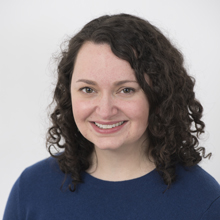Health in Mind, Body, and Spirit: The College of Nursing and Health
 By Sarah DeMarais
By Sarah DeMarais
Gandhi once offered this litmus test: Recall the face of the poorest and weakest person you have seen, and ask yourself if the step you contemplate is going to be any use to them.
After my recent trip to visit LIM students in East Africa, Gandhi’s words bring a new face to mind.
My husband and I visited ministry sites of the Franciscan sisters in Nairobi, Kenya.
People in Nairobi’s Madoya slum live in crumbling shacks. The neighborhood’s one source of running water is run by a price-gouging criminal gang.
For one home visit, we stepped on decaying wood - a rickety, makeshift bridge - crossing over flowing, open sewage. We entered a dark shack - hardly large enough for an adult to sleep on the dirt floor, let alone a family of three. The resident is a single mother, with two young children. She is on the verge of eviction from her home, and she is dying of complications from HIV/AIDS. As our translator shares this with us, the woman begins to cry, because she doesn’t know what will happen to her children when she dies.
My heart breaks, I tear up, I feel paralyzed by the overwhelming need…. and, eventually, we leave. I leave Nairobi, fly back to the US.
Months later, I’m still grappling with how this brief encounter, and others like it, should inform my work at Loyola.
One story about Pope Francis has helped me to make some sense of things.
Pope Francis once traveled to the Philippines and listened to the heartbreaking stories of a 12-year-old girl growing up on the streets. He set aside his prepared text and ministered to the girl. He simply loved the person in front of him. He concluded by addressing his audience, with:
“Pardon me that I read practically nothing of what I had prepared. But… realities are greater than ideas. And the reality [this young person] described is greater than the ideas which I had prepared.”
In counseling, nursing, and ministry, our work begins with the realities of human lives. Wellness in mind, body, and spirit comes through relationships and communities rooted in particular, embodied, realities.
So here’s the hopeful part of this story: the woman I met in Madoya is surrounded by a loving community.
The Franciscan sisters and school staff are educating her children, offering physical and spiritual care in a safe environment. They helped her find a better and more accessible clinic for HIV/AIDS treatment. They are advocating for her with her landlord, and they are treating her with dignity. This community has rallied around the family for care of mind, body, and spirit in the midst of profound suffering.
As many articles as I can read about education, or HIV/AIDS, or sustainable development in urban slums, meeting this woman in Nairobi was far more powerful.
When I think about her, my mind quickly seeks comfort in abstractions about the injustices of our global economy - which are certainly valid - but I challenge myself not to lose sight of this very real human person who is suffering.
The realities of the lives of our clients, our patients, our students, are always more important than ideas.
To return to Gandhi, as we consider our service and our scholarship at Loyola, how can this be of use to the poorest and weakest?
Our Jesuit Catholic mission, like Gandhi, insists we must be biased in which realities we attend to - in whom we center, and how we serve. We are called to encounter the realities of those on the margins of society.
As we prepare excellent counselors, nurses, educators, and ministers, we strive to form those who will take seriously the realities of the poor and vulnerable, and build communities of care and belonging around the world.
Sarah DeMarais of the Loyola Institute for Ministry is manager for a grant from the Conrad N. Hilton Foundation entitled "Sisters in Partnership for Sustainability" that works with Catholic sisters in South Sudan, Kenya, Uganda, and Tanzania on Catholic Social Teaching and sustainability. Sarah offered these reflections at the beginning of the September 10 meeting of the College of Nursing and Health.
